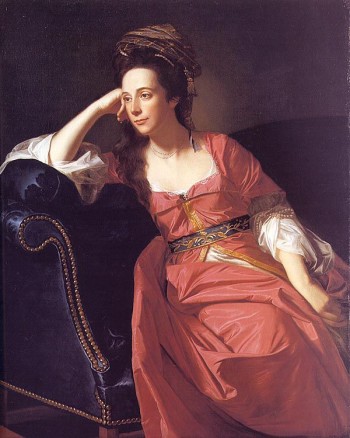“The grenadier and light infantry companies were taken off duty, upon the plea of learning a new exercise, which made the Bostonians jealous, that there was some scheme on foot. A daughter of liberty, unequally yoked in point of politics, sent word, by a trusty hand, to Mr. Samuel Adams, residing in company with Mr. [John] Hancock at Lexington, about thirteen miles from Charlestown, that the troops were coming out in a few days.”
“A number of officers dined together at Cambridge, and toward night scattered themselves upon the road leading to Concord; and took their station so as to be ready to intercept any expresses going from Boston to alarm and raise the country, with intelligence of the troops being upon their march. When the corps was nearly ready to proceed upon the expedition, Dr. Warren, by a mere accident, had notice of it just in time to send messengers over the neck and across the ferry, on to Lexington, before the orders for preventing every person’s quitting the town were executed. The officers intercepted several, but some being well mounted, escaped their vigilance; and the alarm, being once given, spread apace, by the ringing of bells, and the firing of signal guns and vollies. By eleven at night, eight hundred grenadiers and light infantry, the flower of the army, embarked at the common, proceeded and landed at Phipps’s farm, from whence they marched for Concord, under the command of lieutenant colonel Smith, aided by major Pitcairn, who led the advanced corps.”
Source: Gordon, William. The History of the Rise, Progress, and Establishment, of the Independence of the United States of America: Including an Account of the Late War; and of the Thirteen Colonies from their Origin to that Period. 4 vols. London: Charles Dilly and James Buckland, 1788. The first quote relative to the “unequally yoked” is from Vol. 1, p. 476. The second, on the British activities on the night of April 18-19, 1775, appears in Vol., 1, pp. 477-478.
Commentary: Reverend William Gordon, by permission of Joseph Warren and the Massachusetts Provincial Congress, interviewed just days after the events, participants in the outbreak of war at Lexington and Concord. He did so independently of the depositions taken by a committee of the Congress and incorporated into the Patriots’ official account. Gordon incorporated his notes into his book length history of the American Revolution, published in England in 1788 and quoted above.
Gordon’s terse account of the British contingent embarking on their errand specifies Joseph Warren’s role in dispatching express riders to raise the alarm and muster the Patriot militia between Boston and Concord. While omitting many details he may have known as fact or rumor, Gordon does include some tantalizing detail found nowhere else. He describes an unnamed Daughter of Liberty, yoked in a politically mixed marriage, as the source of a false alarm communicated to Samuel Adams in Lexington several days prior to the British foray and fighting on April 19, 1775. Subsequent historians and novelists have conflated the Daughter of Liberty’s message to Samuel Adams with Joseph Warren’s actions dispatching Paul Revere and William Dawes, to concoct a romantic and very persistent yarn. They infer that the strikingly beautiful Mrs. Margaret Kemble Gage, spouse of British Governor General Thomas Gage, was the source of Joseph Warren’s intelligence on British army evolutions. I muse on this supposed Dr. Warren – Margaret Gage interaction in my biography of Warren.

 Follow
Follow